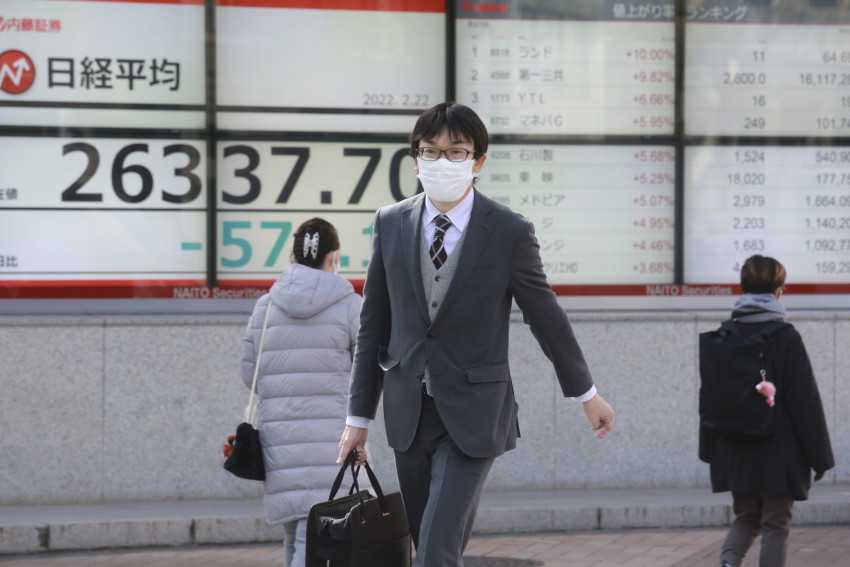Asian shares drop as Putin orders troops to east Ukraine

Shares fell sharply in Asia on Tuesday after Russian President Vladimir Putin ordered troops into separatist regions of eastern Ukraine, suggesting a long-feared invasion was possibly underway.
Tokyo’s Nikkei 225 index dropped 1.8% and the Hang Seng in Hong Kong fell 3.2% in early trading. Oil prices jumped, with U.S. crude up 2.8%. The future for the S&P 500 dropped 1.5% while the contract for the Dow industrials lost 1.3%.
U.S. markets were closed Monday for Presidents Day. In Europe, shares slipped Monday as investors awaited developments in the Ukraine crisis. Germany’s DAX gave up 2.1%. In Paris, the CAC 40 in Paris declined 2%. Britain’s FTSE 100 fell 0.3%.
A vaguely worded decree signed by Putin cast the order for troops to move into eastern Ukraine as an effort to “maintain peace." He also recognized the independence of the separatist regions, apparently dashing slim remaining hopes of averting a conflict that could cause massive casualties, energy shortages on the continent and economic chaos around the globe.
The White House issued an executive order to prohibit U.S. investment and trade in the separatist regions, and additional measures — likely sanctions — were to be announced Tuesday.
In Asian trading, the Nikkei 225 in Tokyo was down 477.52 points at 26,433.46 while Hong Kong's Hang Seng gave up nearly 793.51 points to 23,376.95. South Korea's Kospi lost 1.7% to 2,697.74 and the Shanghai Composite index fell 1.5% to 3,439.86. Australia's S&P/ASX 200 lost 1.3% to 7,142.60.
Russia is a major energy producer and the tensions have led to extremely volatile energy prices. The tensions in Eastern Europe have added to uncertainty at a time when markets have been preoccupied over how the world’s central banks, especially the U.S. Federal Reserve, will act to counter surging inflation while coronavirus outbreaks fueled by the highly contagious omicron variant cloud the outlook.
“Indeed, a full-scale invasion of Ukraine by Russia will leave many central banks with itchy hiking trigger fingers in a quandary," Jeffrey Halley of Oanda said in a report. “The immediate impact would be an exacerbation of the rampant inflationary pressures globally as oil hits $130.00+ a barrel," he said.
Oil prices already have surged to their highest level since 2014. U.S. benchmark crude oil advanced $2.57 to $92.79 per barrel Tuesday in electronic trading on the New York Mercantile Exchange. Brent crude, the basis for international pricing, added $1.45 to $96.84 per barrel.
On Wall Street on Friday, stocks capped a week of volatile trading with a broad sell-off. The S&P 500 and Dow Jones Industrial Average both slipped 0.7%. The Nasdaq composite bore the brunt of the selling, skidding 1.2%. Small company stocks also fell, with the Russell 2000 index down 0.9%.
Treasury yields have fallen as investors shift money into the safety of U.S. bonds. The yield on the 10-year Treasury, which affects rates on mortgages and other consumer loans, sank to 1.86% by early Tuesday from 1.93% on Monday. In currency trading, the U.S. dollar slipped to 114.72 Japanese yen from 114.74 yen late Monday. The euro fell to $1.1308 from $1.1312.
Source: https://japantoday.com
Tags :
Previous Story
- Asian stocks follow Wall St higher after rebound
- Asian stocks mostly lower, eyeing Fed, China Omicron...
- Asian shares mixed after tech-led decline on Wall...
- Asia looks to China-focused RCEP trade bloc as...
- Asian shares mostly slip amid lingering Omicron worries
- Asian shares mixed as Omicron worries crimp market...
- Asian markets bounce back from omicron sell-offs
- Asian stocks fall on concern about virus, tighter...